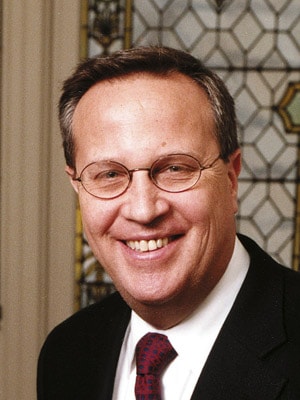
Over Regulation Keeps Foreign Universities Out of India
Under Richard C. Levin, Yale University has increased engagement with Indian institutions. He speaks to Anirvan Ghosh about why the university won't be setting up a campus anytime soon in India
Richard C. Levin
Age: 64
Designation: President of Yale University, Frederick William Beinecke Professor of Economics
Education: B.Litt in Philosophy and Politics (Oxford); Ph.D in Economics (Yale)
Career: Joined Yale in 1974; is on Barack Obama’s council of advisors on science and technology
Interests: Alpine hiking; following the San Francisco Giants baseball team
Q Do you see yourself in India soon, if the Foreign Universities Bill is passed?
Not now. We are trying for a 1,000-student capacity campus in Singapore, and we will see how that goes. Based on the success of this project, and the passage of the Foreign Universities Bill in the Indian Parliament, we might look at setting up a campus here in the future, but it has to be on a bigger scale. As of now, I see mostly the middle rung universities coming here.
Q What holds back top foreign universities from coming to India?
One is over-regulation. When we do come, we surely do not want to have a government nominee running the show. We would want to appoint who we think is best to run the university. Second, there is a lack of autonomy. Recently, I had a meeting with some vice chancellors of Indian universities in Yale, and they all said that making more relevant syllabi or courses is so difficult here. That keeps them from having a competitive edge over others, and we sure do not want to be caught in that situation.
Q Having great faculty is critical, particularly for research. How will you ensure that if you set up a campus here?
That is the biggest challenge for us, when we thought of setting up a campus here. It is even bigger a challenge in India than say China. If you see what happened there, you see now star faculty getting four to five times the salary of other teachers. These are talented people whom the Chinese government has succeeded in bringing back to China from senior teaching and research positions in the US. Faculty in two universities is paid four to five times higher. We probably cannot have such a sharp differential in India, unless there is new legislation. It would, therefore, be difficult to bring talented Indian professors here.
Q Currently, all educational institutions must be non-profit. Would that be a deterrent among US universities coming to India?
I think its best to go for not-for-profit universities. If you look at the US, for-profit universities are a small percentage and that too mostly in distance education. Allowing them to come in would make it possible for guys to set up campuses without focussing on the quality of education.
Q The government says that regulations ensure quality.
Regulation that stifles creativity is clearly bad, else your own house would have been in order. Plus, with too much of that, you do not make better universities, you just make sure that the really talented guys go out. We want autonomy in deciding the syllabus and appointing faculty.
By regulation in faculty, you mean the quota system?
Yes. We cannot accept quotas in faculty as a mandatory condition. Let me tell you, we are all for affirmative action and practice it aggressively at Yale. We would like it to be voluntary as it is in the US.
What do you think of the China model of setting up good universities? Will that work here?
In 1998 the Chinese government selected 30 universities for more funding – seven among them were further chosen for even more funding, and finally two were chosen for the highest level of funding and with an express objective – to be of the same standards as Harvard or Yale by 2025. But that would be difficult to get done in India because of existing legislation. There is little use classifying some universities as Ivy-League without allocating enough resources.
(This story appears in the 30 November, -0001 issue of Forbes India. To visit our Archives, click here.)





